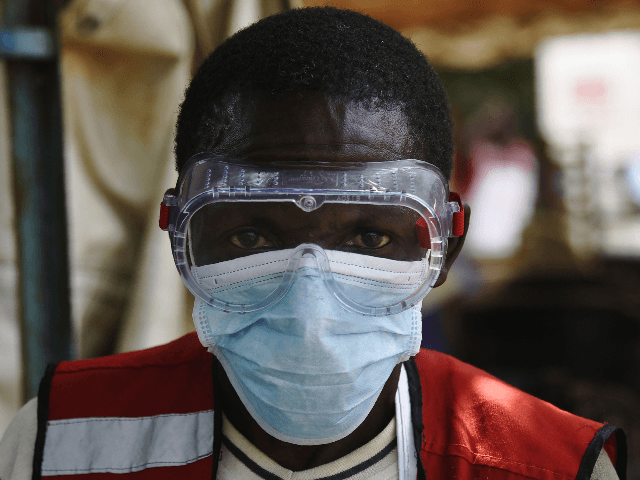The Democratic Republic of Congo (DRC) confirmed its first case of Chinese coronavirus on Wednesday in a Congolese national who recently returned to Kinshasa from France.
The nation had recently celebrated the discharge of its last Ebola patient and had begun the countdown to ending the second-worst Ebola outbreak in recorded history worldwide.
After two years of attempting to contain Ebola – a far less contagious, but far deadlier, virus than the Chinese coronavirus – DRC’s medical institutions are in a fragile state. Ebola outbreaks in Africa tend to attract violence against health workers on the part of locals who fear that doctors and scientists are deliberately spreading the disease, rather than containing it. The Ebola outbreak took place largely in North Kivu and Ituri provinces, regions ravaged by guerrillas fighting over natural resources and lying on a porous border with Rwanda and Uganda.
The World Health Organization (WHO) declared the Ebola outbreak a Public Health Emergency of International Concern (PHEIC) in 2019. The WHO declared the Chinese coronavirus a pandemic on Wednesday, a day after communist authorities in its origin country claimed to have finally controlled the virus’s spread in Wuhan, the city where doctors first documented novel coronavirus cases.
China has faced substantial criticism for hiding evidence of an outbreak for over a month and using the repressive communist apparatus to silence health officials who attempted to warn the public to take precautionary measures in the face of a contagious disease.
Congolese Minister of Health Eteni Longondo confirmed the case on Wednesday and told local media that the individual, a man, was “more or less well,” a condition he did not elaborate on other than to say the patient did not have a fever. Coronavirus carriers range from completely asymptomatic to experiencing pneumonia, respiratory failure, and death. Longondo added that authorities had identified 109 people who had come in contact with the man and placed them in isolation.
Radio Okapi, a local media outlet, noted that the patient reportedly lives in France at least part-time and officials are rumored to have quarantined him in a hotel in Kinshasa.
While Congo has yet to confirm any other cases, another news agency in the country, Actualité, reported that authorities had identified a suspected coronavirus case in Beni, North Kivu, one of the cities most severely affected by the Ebola outbreak. This patient also reportedly came from outside the region and was staying in a Beni hotel, placed in isolation.
“This morning we were alerted by the community to a patient who presented signs which made us think of the respiratory disease similar to the coronavirus disease,” Beni’s chief medical officer Michel Tosalisana said. “The case is isolated and the investigations so far suggest that there is nothing to fear.”
Actualité did not provide any information linking the individual in Beni to the confirmed case in Kinshasa, nearly 2,000 miles away.
DRC became the tenth country in Africa to confirm cases of Chinese coronavirus, most of them in the continent’s north. China has increasingly developed diplomatic ties with corrupt regimes throughout Africa using its Belt and Road Initiative (BRI) to offer predatory loans for infrastructure projects, prompting concern that the continent was uniquely vulnerable to an outbreak. At press time, however, Africa is significantly less affected than Asia, North America, and Europe by the outbreak.
“It is sad to hear that just as the DRC appears to be near ending its worst Ebola outbreak, a new virus is threatening the health of its citizens,” Matshidiso Moeti, the WHO’s Regional Director for Africa, said on Wednesday. “However, some of the readiness efforts put in place during the Ebola outbreak may help the country respond to COVID-19. WHO is here to support you, just as we continue to do in the Ebola response.”
Jean-Jacques Muyembe, the director-general of the National Institute of Biomedical Research (INRB) in DRC, made the opposite case on Tuesday, arguing that the Chinese virus could cause significantly more deaths in DRC than elsewhere because of its dilapidated healthcare system.
“The mortality rate we see is in Europe, where health structures are organized,” Muyembe said. “If this virus comes to us in Africa, in the DRC where the health system is very weak … there will be a very large influx of patients. We will certainly have a mortality rate that will be around ten percent.”
In the United States, director of the National Institute of Allergy and Infectious Diseases Anthony Fauci alarmed Congress by estimating that the coronavirus death rate is about one percent.
“The problem we will have is respiratory problems, we will have to revive the sick. Most of our hospitals do not have these capabilities. They do not have a disinfectant to protect the nursing staff. Once the caregivers start to get sick, there will be panic,” Muyembe predicted.
DRC has not identified an Ebola case in 21 days, according to the WHO. On March 3, Congo’s health experts celebrated the release of the last patient confirmed to have Ebola from a treatment center in Beni. Another 46 people who came in contact with the patient remained in isolation to monitor a potential infection until Tuesday, when the last 11 of the group tested negative for the virus and were discharged from isolation.
The WHO cannot declare the outbreak over until 42 days after the last Ebola case has been identified. The last such case was identified on February 17, meaning DRC must wait another 19 days to declare it is Ebola-free.

COMMENTS
Please let us know if you're having issues with commenting.